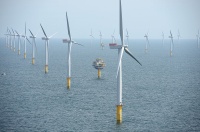No edit summary |
No edit summary |
||
| Line 108: | Line 108: | ||
===Retrieved from:=== | ===Retrieved from:=== | ||
Adapted from https://odims.ospar.org/odims_data_files/ and merged with existing wind parks from NL: https://www.noordzeeloket.nl/en/up-date-atlas/ | |||
===Description:=== | ===Description:=== | ||
Details of the location and status of offshore renewable energy developments in the OSPAR region, combined with details from the Noordzeeloket for the Dutch EEZ (The last dataset is made from supplied and verified information from developers, after which these are recorded in permits). | |||
===Retrieval Date:=== | |||
2017/10 | |||
</div> | </div> | ||
</div> | </div> | ||
Revision as of 14:36, 7 November 2019
 | |
| Layer Info | |
|---|---|
| Category | Activities |
| Sub-Category | Energy |
| Energy Type | Green |
| Editable | Yes |
| Data source | OSPAR, manual updates |
| Bathymetry Min | 0m |
| Bathymetry Max | -150m |
| Production Min | x MWh/KM2 |
| Production Max | x MWh/KM2 |
| Resource | Wind Speed |
| Types | |
| 6MW | |
| 9MW | |
| Floater | |
Description:
Offshore wind power or offshore wind energy is the use of wind farms constructed in bodies of water, usually in the ocean on the continental shelf, to harvest wind energy to generate electricity. Higher wind speeds are available offshore compared to on land, so offshore wind power’s contribution in terms of electricity supplied is higher, and NIMBY opposition to construction is usually much weaker. Unlike the typical usage of the term "offshore" in the marine industry, offshore wind power includes inshore water areas such as lakes, fjords and sheltered coastal areas, utilizing traditional fixed-bottom wind turbine technologies, as well as deeper-water areas utilizing floating wind turbines.
@Wikipedia
MSP Challenge 2050:
Wind Farms are used to produce green energy, the production amount is calculated based on the maximum amount of energy that can be produced in the designated area.
Wind Farms are polygons, i.e., geometric shapes that you can draw in, edit or remove when making a plan. They create the following pressures on the ecosystem:
- Artificial Substrate
- Noise
- Surface Disturbance during construction only
- (NS)Bottom Disturbace during construction only
Wind farms disallow all the bottom trawl, and industrial and pelagic trawl fishing fleets. Drift and fixed nets fleets are only disallowed during construction.
Placement Restrictions:
The placement restrictions decide whether the overlap of spatial elements causes:
Errors - Impossible to place these layers on top of each other due to physical limitation.
Warnings - Warnings that it should be done, but wont stop the placement.
| Error | Warning | |
|---|---|---|
| Country | x | |
| Shipping Lane | x | |
| IMO Route | x | |
| Port | x | |
| Anchorage | x |
Type Overview:
The Wind Farm layer has "To Be Defined" types, this overview shows the core information, for further info you can navigate to the type using the InfoBox on the General Information tab.
| Bathymetry Min | Bathymetry Max | Production per KM2 | |
|---|---|---|---|
| Type x | x m | x m | x MW/km2 |
Pressure on Ecology:
The ecological pressures are scaled on a level from 0 to 1, with 0 having none, and 1 having the maximal impact on that pressure.
| State | Artificial Substrate | Noise | Surface Disturbance | Bottom Disturbance |
|---|---|---|---|---|
| Under construction | 0.4 | 0.8 | 0.5 | 0.6 |
| In production | 0.4 | 0.1 | 0.1 |
Energy Calculation:
The energy production is calculated using the following algorithm: N/A
Retrieved from:
Adapted from https://odims.ospar.org/odims_data_files/ and merged with existing wind parks from NL: https://www.noordzeeloket.nl/en/up-date-atlas/
Description:
Details of the location and status of offshore renewable energy developments in the OSPAR region, combined with details from the Noordzeeloket for the Dutch EEZ (The last dataset is made from supplied and verified information from developers, after which these are recorded in permits).
Retrieval Date:
2017/10
 Co-funded by the European Union.
Co-funded by the European Union.